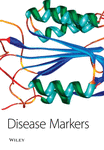Gene Expression and Methylation Signatures of MAN2C1 are Associated with PTSD
Abstract
As potential regulators of DNA accessibility and activity, epigenetic modifications offer a mechanism by which the environment can moderate the effects of genes. To date, however, there have been relatively few studies assessing epigenetic modifications associated with post-traumatic stress disorder (PTSD). Here we investigate PTSD-associated methylation differences in 33 genes previously shown to differ in whole blood-derived gene expression levels between those with vs. without the disorder. Drawing on DNA samples similarly obtained from whole blood in 100 individuals, 23 with and 77 without lifetime PTSD, we used methylation microarray data to assess whether these 33 candidate genes showed epigenetic signatures indicative of increased risk for, or resilience to, PTSD. Logistic regression analyses were performed to assess the main and interacting effects of candidate genes’ methylation values and number of potentially traumatic events (PTEs), adjusting for age and other covariates. Results revealed that only one candidate gene–MAN2C1–showed a significant methylation x PTE interaction, such that those with both higher MAN2C1 methylation and greater exposure to PTEs showed a marked increase in risk of lifetime PTSD (OR 4.35, 95% CI: 1.07, 17.77, p = 0.04). These results indicate that MAN2C1 methylation levels modify cumulative traumatic burden on risk of PTSD, and suggest that both gene expression and epigenetic changes at specific loci are associated with this disorder.




